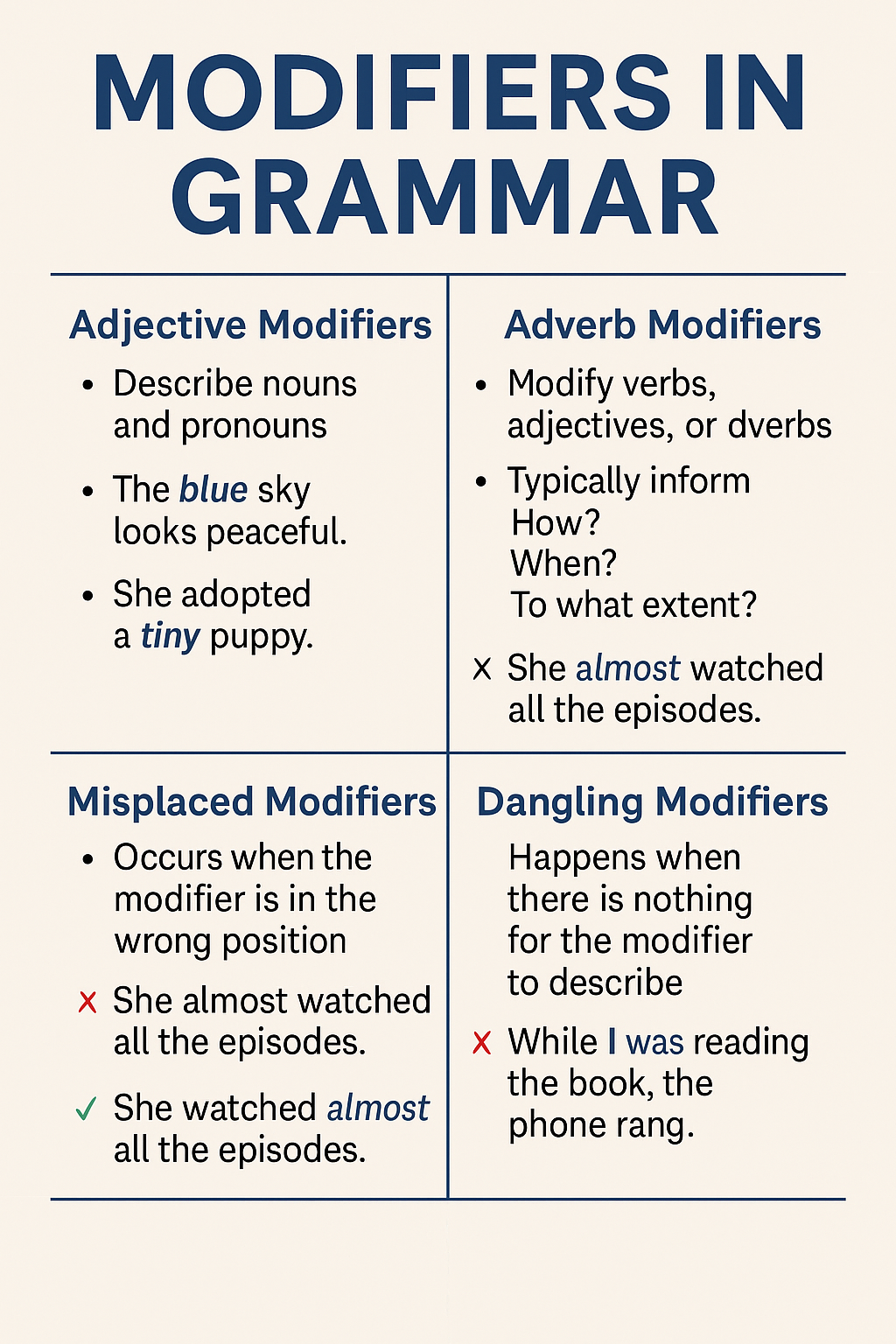Modifiers in Grammar-Special Grammar Case-3
Introduction to Modifiers in Grammar
Modifiers are words, phrases, or clauses that provide description or additional detail in a sentence. They help writers express ideas more precisely by answering questions such as: Which one? What kind? How many? When? Where? Why? How?
Understanding modifiers in grammar is key to writing with clarity, accuracy, and elegance. They appear in various forms—single words like adjectives and adverbs, or more complex structures like modifying phrases and clauses. Proper placement of modifiers ensures the sentence makes sense. Misplaced or dangling modifiers, however, can confuse readers and create grammatical errors.
Major Types of Modifiers in Grammar
Let’s explore the major categories of modifiers with examples.
1. Adjective Modifiers
Adjectives are the most basic form of modifiers. They describe or qualify nouns and pronouns.
Examples:
- The blue sky looks peaceful.
- She adopted a tiny puppy.
Adjectives usually answer:
- Which one?
- What kind?
- How many?
Correct Use:
- A helpful student volunteered to assist.
- We visited three ancient cities in a week.
2. Adverb Modifiers
Adverbs modify verbs, adjectives, or other adverbs. They often end in -ly, but not always.
Examples:
- She ran quickly.
- The story was surprisingly good.
- He drove very fast.
Adverbs answer:
- How?
- When?
- Where?
- To what extent?
3. Prepositional Phrases as Modifiers
Prepositional phrases can act as adjectives or adverbs.
Examples:
- The girl with the red scarf smiled. (adjective)
- He walked along the river. (adverb)
Always ensure these phrases are placed near the word they modify.
4. Participial Phrases as Modifiers
Participial phrases start with a present or past participle and describe a noun.
Examples:
- Running through the field, the dog barked with joy.
- Shocked by the news, she remained silent.
Incorrect placement leads to dangling modifiers, discussed later.
5. Infinitive Phrases as Modifiers
Infinitive phrases begin with “to” + base verb and often modify a noun or pronoun.
Examples:
- She has a book to read before class.
- We need a plan to save money.
6. Appositive Modifiers
An appositive is a noun or noun phrase that renames another noun or noun phrase beside it.
Examples:
- My brother, a talented guitarist, plays in a band.
- The novel, a classic of English literature, is on the syllabus.
Appositives must be punctuated correctly depending on whether they are essential or non-essential.
7. Relative Clauses as Modifiers
Relative clauses (beginning with who, which, that) act as adjectives, providing extra details.
Examples:
- The student who studied hard passed the exam.
- I watched a movie that made me cry.
These clauses must be placed directly after the noun they modify.
Misplaced Modifiers
A misplaced modifier is placed too far from the word it is intended to describe, causing confusion.
Example:
She almost watched all the episodes. (Incorrect)
She watched almost all the episodes. (Correct)
Correction Strategy:
- Move the modifier closer to the target noun or verb.
- Read the sentence aloud to hear any awkwardness.
Dangling Modifiers
A dangling modifier lacks a clear subject, making the sentence illogical.
Example:
While reading the book, the phone rang.(Incorrect)
While I was reading the book, the phone rang.(Correct)
Fix by:
- Adding the missing subject
- Rewriting the sentence for clarity
More examples:
After finishing the meal, the dishes were washed.(Incorrect)
After finishing the meal, she washed the dishes.(Correct)
Modifier Placement Rules
To avoid confusion and grammar mistakes, follow these core rules:
➤ Place modifiers close to the words they modify
Wrong: I saw a bird flying through binoculars.
Right: I saw a bird through binoculars flying overhead.
➤ Use commas properly with nonessential modifiers
- My teacher, who loves poetry, gave us a writing prompt.
(Use commas for non-restrictive clauses)
➤ Use hyphens in compound modifiers before nouns
- A well-written article
- A high-speed chase
Advanced Tips on Modifiers in Grammar
- Avoid double modifiers:
He was more taller than his brother.(Incorrect)
He was taller than his brother.(Correct) - Do not overuse modifiers:
The very incredibly amazingly fast car zoomed by.(Incorrect)
The fast car zoomed by.(Correct) - Use coordinate modifiers with commas:
It was a long, boring lecture.(Incorrect)
(If you can say “long and boring,” they are coordinate) - Do not confuse limiting modifiers (only, just, even) placement:
Only she wants to speak to the manager.(Incorrect)
(Does only she want to speak, or does she want to speak only to the manager?)
She wants to speak only to the manager.(Correct)
Practice Exercises (Optional for Classroom Use)
Identify and Fix the Modifiers:
- Barking loudly, the baby was scared of the dog.
- Eager to impress the teacher, the homework was finished early.
- She nearly worked for two hours on that task.
Answers:
- The dog was barking loudly, and the baby was scared.
- Eager to impress the teacher, he finished the homework early.
- She worked for nearly two hours on that task.
Conclusion: Mastering Modifiers in Grammar
Modifiers are essential tools in grammar. They shape meaning, add detail, and clarify ideas. Whether you’re using single adjectives or full modifying phrases, placement and precision matter.
By understanding the types—adjective modifiers, adverb modifiers, phrases, clauses, and appositives—you gain full control over how your sentences read. Avoid dangling and misplaced modifiers by revising your writing carefully.
Writers who master modifiers in grammar produce clearer, stronger, and more expressive work. Practice regularly and proofread intentionally, and soon, your modifier usage will become second nature.

China’s Way to Progress: https://englishwithnaeemullahbutt.com/2025/06/03/chinas-way-to-progress/
Dangling Modifiers in Grammar:
https://grammarpuzzlesolved.englishlitnotes.com/dangling-modifiers-in-grammar/
Allen Ginsberg as a Modernist Writer:
https://americanlit.englishlitnotes.com/allen-ginsberg-modernist-writer/
The Neoclassical Period in English Literature:
https://englishlitnotes.com/2025/06/28/neoclassical-period-in-english-literature/
Discover more from Grammar Puzzle Solved by Naeem Ullah Butt
Subscribe to get the latest posts sent to your email.
